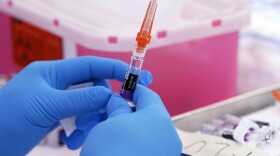Nurses on strike at a New Orleans hospital days before Super Bowl 59 takes over the Caesars Superdome received support from a significant backer Friday afternoon — the National Football League Players Association (NFLPA).
In a statement, the NFLPA said it “stands in solidarity” with the nearly 600 LCMC Health Systems nurses at University Medical Center (UMC) who are striking for renewed negotiations toward their first union contract. They’re seeking better pay, improved staffing and enhanced safety measures for both patients and hospital staff.
“Over a year ago, these nurses made the courageous choice to organize and win a historic union election to improve conditions at University Medical Center,” the statement read. “Now, instead of collaboration, they're facing a lockout during Super Bowl weekend.”
Our union fully supports the LCMC nurses pic.twitter.com/QBrlkiRZ7W
— NFLPA (@NFLPA) February 7, 2025
The strike was intended to last only two days — from Wednesday through Thursday — but hospital administrators have locked the striking nurses out through the weekend, citing obligations with the staffing company who brought in contract nurses to fill in during the strike. The hospital maintains that its priority remains the well-being of patients and that operations will continue as scheduled.
In its statement, the NFLPA urged LCMC to respect nurses’ right to bargain, work toward a fair contract and prioritize patient care over conflict.
“When nurses have a voice, patients are safer,” the statement read. “New Orleans, its people, and its visitors deserve the very best. Let’s support the nurses who support us.”
The nurses’ walkout marked the second strike by the hospital’s nursing staff, citing stalled negotiations and alleged union-busting tactics by hospital management.
The decision to strike during the week of the Super Bowl is strategic, nurses said, aimed at drawing attention to their cause and pressuring administrators to return to the bargaining table.
“If we're getting further along in that and that feels like really meaningful dialogue and communication, then I think that would be a huge win,” Hailey Dupré, a nurse at UMC and a member of the hospital’s union, said.
This strike comes just over a month after a terrorist attack on Bourbon Street on New Year’s Day, which sent several victims to UMC’s emergency department. Nurses working that day said the hospital was unprepared for the influx of patients, an issue they argue is tied to chronic understaffing.
Dupré said the incident highlighted ongoing concerns about staff shortages and patient care.
“Nurses who worked that day didn’t get breaks at all,” she said. “They barely had time to drink water. They just didn’t have the staff to support the needs that day.”
Hospital administrators have denied these claims, calling them “false” and “dangerous.” In a statement, UMC said that the hospital was fully equipped to handle the mass casualty event and that staff responded appropriately to the emergency.
This latest strike follows a growing trend of health care worker protests across the country, many of which have short durations intended to minimize the impact on patients.
The outcome of the UMC nurses’ strike could have broader implications for union efforts in the health care industry, particularly in Louisiana, where organized labor movements in hospitals have historically faced challenges.
This story was produced by the Gulf States Newsroom, a collaboration between Mississippi Public Broadcasting, WBHM in Alabama, WWNO and WRKF in Louisiana and NPR. Support for health equity coverage comes from The Commonwealth Fund.













